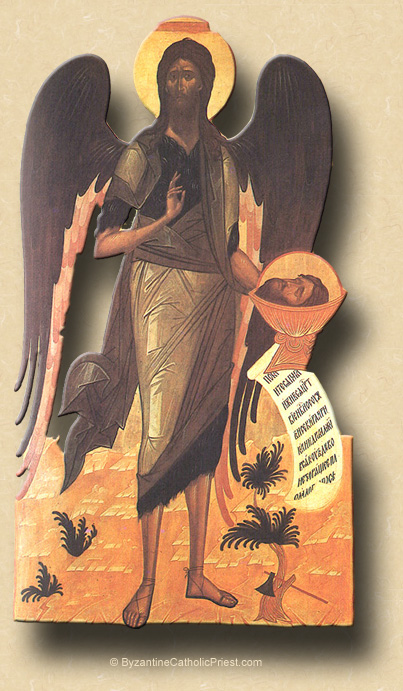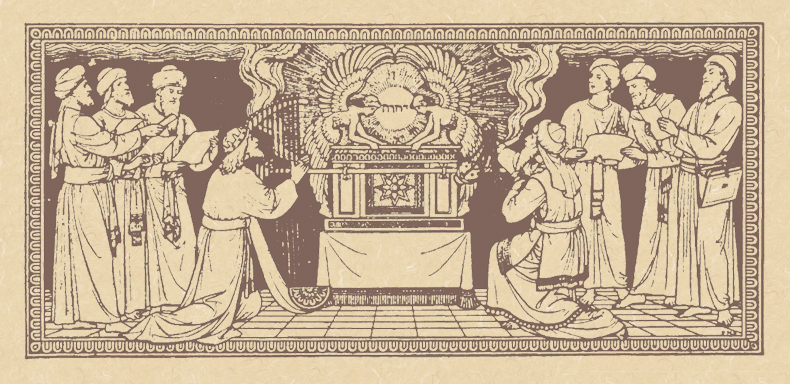Not in the Heavens and not on the Earth, but in the Desert of Your Heart, in the Wasteland of Your Soul.
The Second Sunday of Advent.
Lessons from the secondary dominica, according to the ordinary form of the Roman Rite:
• Isaiah 40: 1-5, 9-11.
• Psalm 85: 9-14.
• II Peter 3: 8-14.
• Mark 1: 1-8.
FatherVenditti.com
|
 9:31 AM 12/7/2014 — If you have cable TV or satellite TV then I'm sure you're familiar with some of the many Christian evangelists who ply their trade there on the various channels. It seems that whatever your tastes or inclinations or opinions may be, there's a TV preacher for you. And you don't even have to believe in anything in particular: if you look hard enough you'll find one that will seem to be saying what you want him to say, or think you want him to say. 9:31 AM 12/7/2014 — If you have cable TV or satellite TV then I'm sure you're familiar with some of the many Christian evangelists who ply their trade there on the various channels. It seems that whatever your tastes or inclinations or opinions may be, there's a TV preacher for you. And you don't even have to believe in anything in particular: if you look hard enough you'll find one that will seem to be saying what you want him to say, or think you want him to say.
This situation is nothing new in the history of religion. In fact, this sort of thing was going on full force at the time Jesus began his public ministry. Palestine, at the time of our Lord, was a hot bed of holy men, so much so that the commander of the Roman Legion in Jerusalem once remarked that, if he had as many troops in his legion as there were prophets and saints running around in the desert, he could conquer the whole world. I'm certain that that's an exaggeration on his part; but, knowing this history should give us a different kind of perspective when we read our Gospel lesson, because it alerts us to the fact that when John the Baptist—and, later, our Lord—appear on the scene and begin their preaching, they are not unique, at least not in the fact that they are in the desert preaching.
The Palestinian Jews and their Roman guests were well used to seeing wandering prophets in the desert. This was a fairly common phenomenon. It should give us pause to think about it because, if itinerant holy men were so much a part of every day life, and if the people were so used to seeing them, then what was it that made John the Baptist stand out so clearly in history? He isn't just mentioned in the Bible: during the reign of Claudius, the Jewish historian Josephus wrote a history of the Jewish people in which he mentions John quite prominently, and also our Lord. For some reason, John made an impact, so much so that he was arrested—something that had never happened to a religious figure in Palestine before—and was ultimately executed, as the Holy Gospels testify.
What made John stand out from among the ranks of Palestine's corps of desert preachers was what he had to say. Most of the desert prophets spent a lot of their words addressing the situation at hand, namely, Roman occupation. Some of them even had bands of followers committed to various political agendas formed around the preaching of their chosen prophet. Judas Iscariot, so the Gospel tells us, was a member of one such group before he met our Lord. Normally, these kinds of people focused on the problem of the military presence in what the Romans called the province of Galilee. But John was different. He didn't talk about the Romans, or about freedom for Israel, or about liberation from military rule. Instead, he preached that people should repent of their sins and change their lives. His message did not address the global situation such as it was, but the situation within each man, the state of his soul, how he stood personally before God. And he targeted the leaders of his own religion, not because he challenged their authority, but because he felt they had, themselves, focused so exclusively on the political situation with Rome that they had neglected the spiritual realities which he believed were so much more important. His baptism of repentance became a symbol for those who had cast aside the affairs of this life to focus on what our Lord would call, a couple of years later, the "one thing necessary”: the state of one's soul before God.
And the reaction of many of John's contemporaries to his preaching is typical, and we often see remnants of it today, especially when someone criticizes the religious point of view as trite, or attempts to make the Gospel of our Lord speak to the needs of today by focusing exclusively on what they so pompously call the “social gospel.” This has not changed since before the time or our Lord; and, for those who could not see beyond the pragmatic concerns concerns of this life, John's preaching was very confusing. They did not understand it; and, typical of men in authority, particularly in religion, what they don't understand or can't figure out they ultimately begin to fear as a threat. This is what led to John's death, and what ultimately contributed to our Lord death on the cross three years later.
Last week I had mentioned to you how this first part of the Advent Season is focused more on preparing for the Second Coming of Christ who will judge us according to our deeds, and only after December 17th does the Liturgy of the Church begin to prepare us to celebrate our Lord's birth, but the two are intertwined: the Old Testament prophecies we read this time of year can all be interpreted both ways. “A voice cries out,” says the prophet Isaiah in today's first lesson: “In the desert prepare the way of the Lord! Make straight in the wasteland a highway for our God!” (40: 3 NABRE). Yes, he predicts the coming of the Baptist, but he also issues a warning to us: in the desert of your tepid and barren heart prepare a way for your Lord; through the wasteland of your soul which has not thought of divine things, perhaps for many years, prepare a straight highway for your God.
As we progress through this Holy Season of Advent mindful of both of its meanings, the preaching of the Baptist and what happened to him as a result are good subjects for our meditation. We know that the Nativity is the incarnation of God into Man;—His active presence among us—and, in preparing to celebrate it, we must be mindful of preparing ourselves for the Second Coming of our Lord as the Divine Judge who will separate forever the living from the dead. This entire season of Advent is designed to remind us that, as we prepare ourselves to celebrate Christ’s first coming in the manger, so we should prepare our souls to receive his second. And, at the risk of repeating myself over and over again, this means making ourselves right with God; and, making ourselves right with God means going to confession, where, in the person of the priest, Christ hears our sins and gives us forgiveness.
It is so easy to be distracted from what is important, so easy to become preoccupied with the practical concerns that press upon our hearts: our jobs, our health, our relationships, our families and their problems; everything other than how our souls stand before God. The Blessed Apostle Peter, in today's second lesson, is venting his frustration at this less than spiritual attitude: he's being peppered with questions about when Christ will come again. Some thought that He would come in their lifetime to deliver them from all their worries, just as some people today treat God like some sort of vending machine: they fire off rosaries and novenas and prayers for this, that and the other, and then just wait for our Lord or our Lady to parachute in and wave their magic hands and make it all better. That never happens, of course, which is when people become testy and angry at God because they missed the whole point of our Lord's life, death and resurrection. The First of the Apostles, in our second reading, says:
The Lord is not being dilatory over his promise, as some think; he is only giving you more time, because his will is that all of you should attain repentance, not that some should be lost. But the day of the Lord is coming, and when it comes, it will be upon you like a thief. The heavens will vanish in a whirlwind, the elements will be scorched up and dissolve, earth, and all earth’s achievements, will burn away. All so transitory… (II Peter 3: 9-11 Knox).
Then he asks the question: “Since everything is to be dissolved in this way, what sort of persons ought you to be[?]” Then he answers his own question: “…conducting yourselves in holiness and devotion, waiting for and hastening the coming of the day of God…eager to be found without spot or blemish before him, at peace” (3: 11, 14 NABRE).
John's preaching was rejected because he didn't preach anything anyone wanted to hear: he didn't tell the suffering how God would solve all their little problems; he didn't tell the social agitators how God was going to fix the world. And, when he told them that what was really important was not how God could make all their troubles go away or remake society, but rather that they must repent of their sins and change their lives—not because they were going to be rewarded for it, but because God was coming—that's when they decided they had to do away with him. We can't fall into the same trap; regardless of whether we're obsessed with our own personal problems, or trying to remake the life of our Lord into a social program to help the poor and the homeless and create some kind of economic paradise on earth. It isn't our personal problems nor society's problems that should concern us most of all; it's becoming what St. Peter tells us to be: “…eager to be found without spot or blemish before him, at peace.”
“In the desert [of your heart] prepare the way of the Lord! Make straight in the wasteland [of your soul] a highway for our God!”

|

